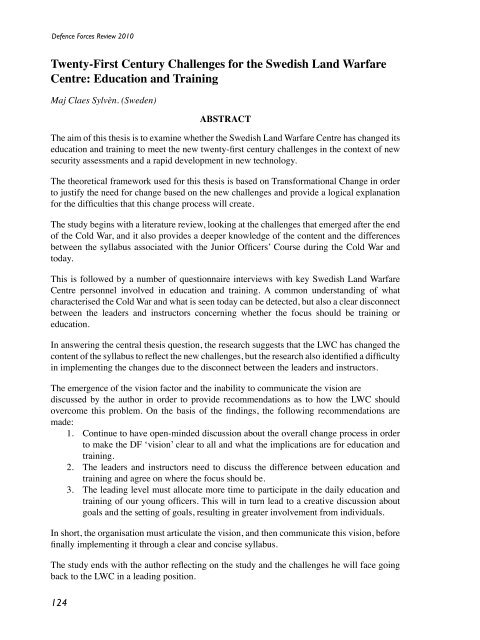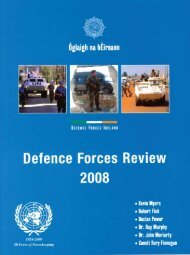Defence Forces Review 2010
Defence Forces Review 2010
Defence Forces Review 2010
You also want an ePaper? Increase the reach of your titles
YUMPU automatically turns print PDFs into web optimized ePapers that Google loves.
<strong>Defence</strong> <strong>Forces</strong> <strong>Review</strong> <strong>2010</strong>Twenty-First Century Challenges for the Swedish Land WarfareCentre: Education and TrainingMaj Claes Sylvèn. (Sweden)124ABSTRACTThe aim of this thesis is to examine whether the Swedish Land Warfare Centre has changed itseducation and training to meet the new twenty-first century challenges in the context of newsecurity assessments and a rapid development in new technology.The theoretical framework used for this thesis is based on Transformational Change in orderto justify the need for change based on the new challenges and provide a logical explanationfor the difficulties that this change process will create.The study begins with a literature review, looking at the challenges that emerged after the endof the Cold War, and it also provides a deeper knowledge of the content and the differencesbetween the syllabus associated with the Junior Officers’ Course during the Cold War andtoday.This is followed by a number of questionnaire interviews with key Swedish Land WarfareCentre personnel involved in education and training. A common understanding of whatcharacterised the Cold War and what is seen today can be detected, but also a clear disconnectbetween the leaders and instructors concerning whether the focus should be training oreducation.In answering the central thesis question, the research suggests that the LWC has changed thecontent of the syllabus to reflect the new challenges, but the research also identified a difficultyin implementing the changes due to the disconnect between the leaders and instructors.The emergence of the vision factor and the inability to communicate the vision arediscussed by the author in order to provide recommendations as to how the LWC shouldovercome this problem. On the basis of the findings, the following recommendations aremade:1. Continue to have open-minded discussion about the overall change process in orderto make the DF ‘vision’ clear to all and what the implications are for education andtraining.2. The leaders and instructors need to discuss the difference between education andtraining and agree on where the focus should be.3. The leading level must allocate more time to participate in the daily education andtraining of our young officers. This will in turn lead to a creative discussion aboutgoals and the setting of goals, resulting in greater involvement from individuals.In short, the organisation must articulate the vision, and then communicate this vision, beforefinally implementing it through a clear and concise syllabus.The study ends with the author reflecting on the study and the challenges he will face goingback to the LWC in a leading position.
















